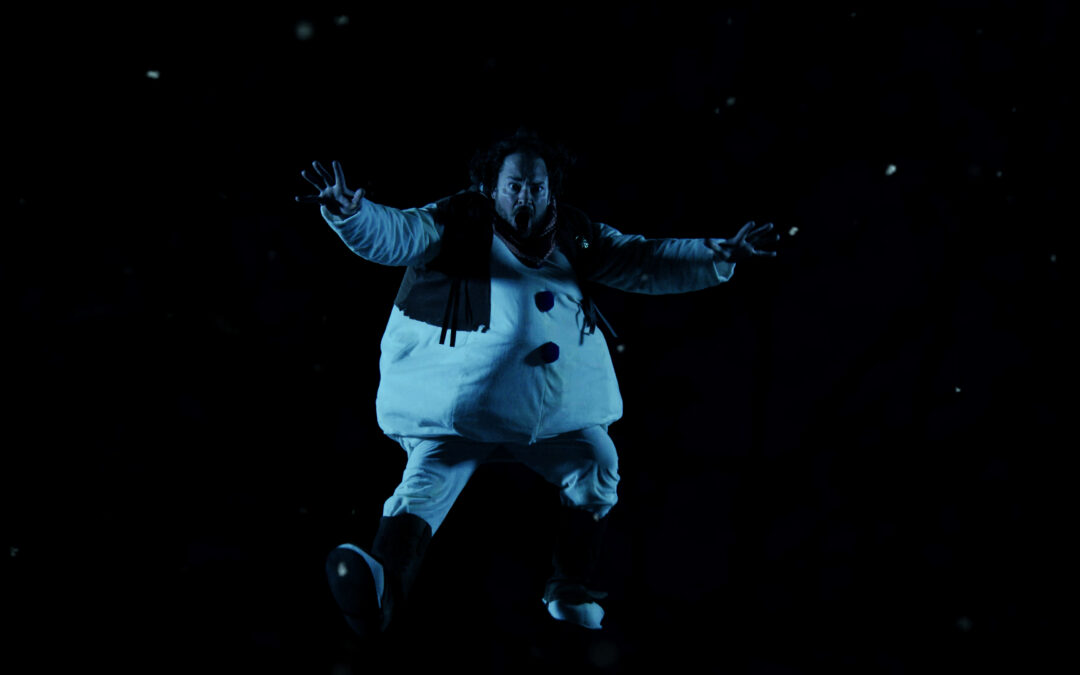(IMAGE: Gravitas Ventures)
Gravitas Ventures. 2021. Drama/Comedy. 102 minutes.
RATING: 3 / 4
Take the typical Danny McBride comedy character and strip him of all the inflated self-assurance, and you might be left with Jerry (Benny Elledge). A small-town semi-success with a dad bod and as much of a drinking problem as anyone else around him, Jerry’s living a minor childhood dream. He’s the station manager at a public access channel that’s home to the show he loved most as a kid: Kringle Time, hosted by a cowboy snowman. Or, rather, a man in a cowboy snowman costume named Herb (Road Warrior and Commando bad guy Vernon Wells). Who’s also Jerry’s potential father-in-law. And an even bigger drinker than Jerry. It’s all a family tradition: Jerry’s dad helped create the show, and Jerry watched it to distract from his parents fighting. But he never stopped believing in the symbol of that snowman, even as the reality steadily became less than satisfactory.
And then Herb drops dead in the middle of the show, bequeathing all his personal effects and the show to Jerry. But there’s a= problem: even though Jerry has been a Kringles superfan for life, his long-held ideas for the show are really bad. (Seriously, as we see on a whiteboard, they involve Ken Starr, and Vince Foster’s suicide, two Clinton-era talking points most of you reading this very likely do not care about any more, if you ever did.) And ambitious producer Daphne (Alyssa Keegan) rather forcefully thinks he should definitely resign the role. Meanwhile, visions of a demonic ghost version of Kringles keep manifesting, though it’s not clear what course of action they’d prefer Jerry to take.
On paper, Jerry maybe doesn’t sound like the guy to root for. But his desperation and general resignation feel familiar. Everyone around him is more ambitious and cutthroat – it’s a truism that even at really low stakes jobs, there’s always a lot of power-tripping and jockeying for position. And Jerry mostly tries to be the guy holding it all together. After all, this was his dream, once. And getting to be Kringles might be that final achievement to unlock.
But what happens when the thing you want turns out to be unspeakably corrupted? Following some new discoveries, Jerry has to figure that out for himself. Though his half-ass dithering makes what might\ otherwise have been an easy call get way more complicated.
The best thing about Zan Gillies’ script is that it doesn’t offer the mega-happy ending in any direction. Life is full of compromises, and it’s clear here that doing the heroic thing will probably cost Jerry everything. If he gets in line, he’ll still have some version of his dream, but have to silence his conscience and inner child. So many times in movies, the Jerrys get to have it all when they follow their heart. This one will not. And a lifetime of semi-defeat shows on his face.
Like Jerry at the station, Elledge is what keeps the whole thing together. His Jerry is the guy we may hope we’re not, but fear we are. His struggle is that of everyone who’s held a job where they can’t talk back to people scapegoating them, but don’t want to quit because it’s not THAT bad a job, just one that nibbles very tiny parts of the spirit away, ever so slowly.
This is a personal pet peeve, but in general I find it overly taxes credibility when characters lapse into visions or daydream sequences, and are taken so utterly out of reality that they can’t even tell what’s going on around them. Generally, people don’t work that way, and maintain some type of functionality. The immersive take is more cinematic – and here, leads to some creative snowman-themed hellscapes – but they need to be on point. And it sometimes feels like director Matthew Lucas is going more for what looks cool than the kind of coherent dream where the symbolism directly relates to the point.
At one point, when Jerry has a daydream, he literally fails to notice he’s being robbed. I don’t quite buy it, unless we accept that the demon Kringles actually is magic rather than just Jerry’s conscience. Still, Elledge mostly sells it, and Wells – with whom, full disclosure, I’ve made two movies – gets to do more with this role than he often does in low-budget fare. One tends to assume he’ll be a name-value cameo, but even though Herb dies early on, he returns to the story quite a bit, and becomes more complex than the villain role we’d expect.
In the press kit, the filmmakers explain they were going for a Christopher Guest/Armando Iannuci vibe. That’s a tall order, and it’s not what they have. (Maybe they think the supporting cast are funnier than they are). This is more of a character study that shows how real underdogs prevail: barely, and with a lot of cost to themselves. It’s the truthful bits that work, even when the comedy doesn’t.
###

